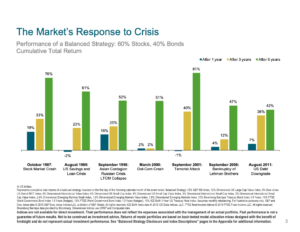2020 has already been challenging on both the national and global stages. The Coronavirus pandemic has quickly sent the world into a state of panic and fear, as businesses and schools shutter their doors, and government agencies advise “social distancing” to prevent the spread of the virus community-wide. It is clear that we are dealing with a health crisis of vast scale and proportion. Our thoughts go out to the families whose lives have been completely upturned by this virus, and to the health care professionals who are on the front lines. Our nation’s health, safety, and well-being are of the utmost importance at this moment, and we hope that developments coming from Washington and the Federal Reserve this week can help ease the burden for those who have been most affected.
Between the pandemic and other geopolitical tensions, such as the recent oil price dispute between Russia and Saudi Arabia, the markets have also been on a rollercoaster ride, with each day bringing more uncertainty. The headlines tell us that we are living in an unprecedented time.
For some of us, it seems like only yesterday that it was 2008, when the stock market dropped in value by almost half. Being a decade removed from the crisis may make it easier to take the past in stride. The eventual rebound and subsequent years of double-digit gains have also helped in this regard. But while the events of the crisis were unfolding, a bright future looked anything but certain.
During that time period, we were used to seeing front-page headlines that read, “Worst Crisis Since the ’30s, With No End Yet in Sight;” “Markets in Disarray as Lending Locks Up;” and “For Stocks, It’s the Worst Single-Day Drop in Two Decades.” For many of us, both investors and advisors alike, simple acts such as reading the news, opening up quarterly statements, or going online to check an account balance were nerve-wracking, dread-filled experiences.
Of course, we know that being an investor today, and during any period, isn’t exactly a stress-free experience. But the feelings of panic and fear felt by many during the financial crisis were distinctly acute. Many investors reacted emotionally to these developments. Some decided they had enough and sold out of stocks altogether.
On the other hand, some investors decided to stay the course and stick to their investment strategy, while chaos and panic-selling ensued. These investors eventually recovered from the crisis and benefited from the subsequent rebound in the markets.
We’re facing a similar moment in history now. It is important to remember that the financial crisis of 2008 was not the first in which periods of substantial volatility have occurred. In the chart below, you will see the performance of a balanced investment strategy following several crises, including the bankruptcy of Lehman Brothers in September of 2008, which took place in the middle of the financial crisis. Each event is labeled with the month and year that it occurred or peaked.

If you had a globally diversified and balanced investment strategy, you would have suffered losses immediately following most of these events — but the financial markets did recover, and you would have recovered along with them, as you can see by the three- and five-year cumulative returns shown above.
Before we are faced with periods of discomfort, it’s essential that we prepare ourselves with a long-term perspective, appropriate diversification, and an asset allocation that aligns with our risk tolerance and goals — these tools help us remain disciplined enough to ride out the bumps along the way. As your financial advisor, we also play a critical role in helping you work through these issues and in counseling you when things look bleak.
As we mentioned earlier, there is no questioning the emotional, physical, and mental toll that the Coronavirus pandemic has caused, particularly for those with family members and loved ones affected by the virus. While we participate in social distancing, maintain strong personal hygiene, and follow the guidelines outlined by the CDC and WHO, it’s important to “keep calm, and carry on.”
We must apply the same mindset to the financial markets. Predicting future events in the markets correctly — let alone predicting how the markets will react to them — is difficult to do. However, what is certain is that market volatility will always be a part of investing. To enjoy the benefit of higher potential returns, investors must actually stay invested long enough to see the other side of the storm.
The foregoing content reflects the opinions of Equita Financial Network, Inc. and is subject to change at any time without notice. Content provided herein is for informational purposes only and should not be used or construed as investment advice or a recommendation regarding the purchase or sale of any security. There is no guarantee that the statements, opinions or forecasts provided herein will prove to be correct. Past performance may not be indicative of future results. Securities investing involves risk, including the potential for loss of principal. There is no assurance that any investment plan or strategy will be successful.




